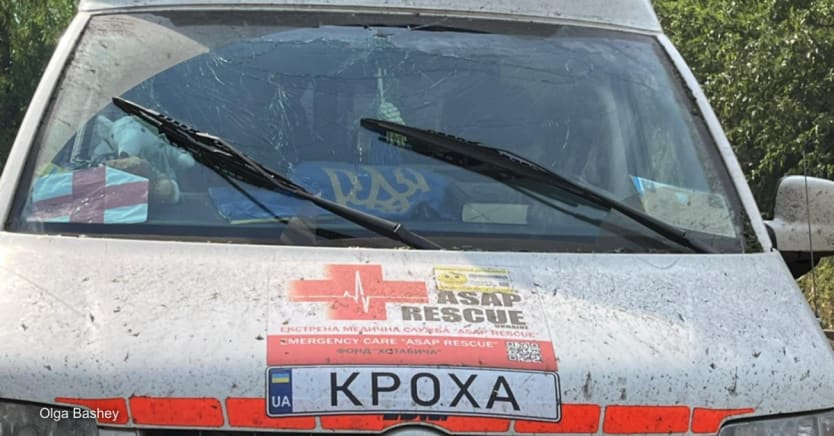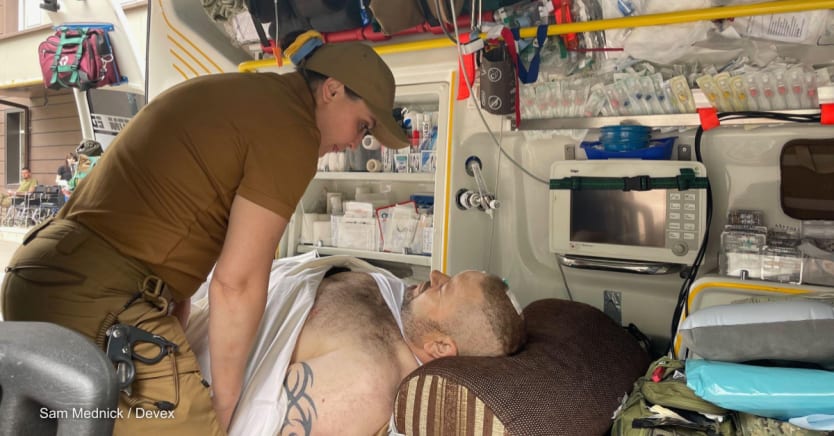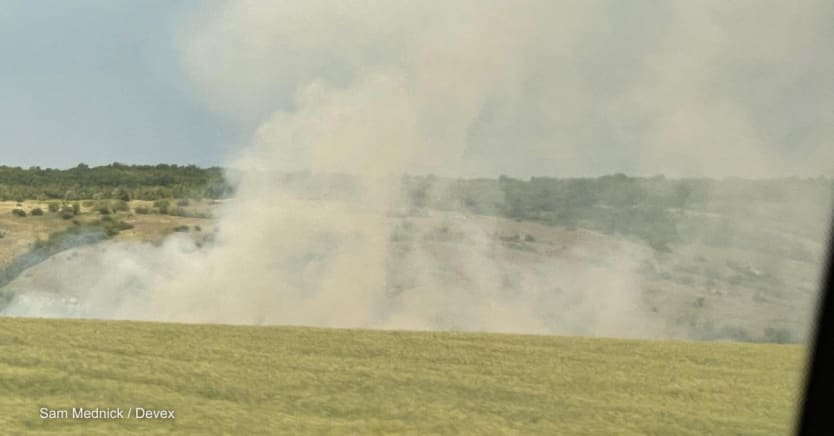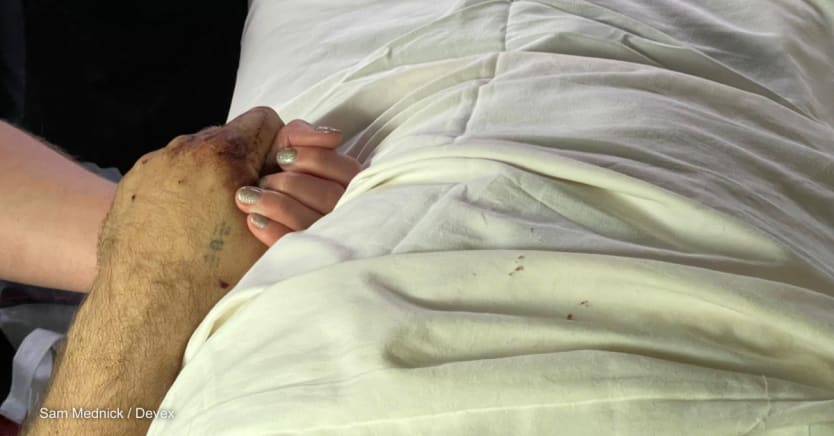
BAKHMUT, Ukraine — Racing into the narrow parking lot of the hospital, a green van screeches to a halt as health staffers rush to the doors. A bloody soldier with a shrapnel wound to his leg moans while trying to keep a brave face as medics roll his stretcher into the operating room in one of the last emergency clinics on the front lines in eastern Ukraine.
“Good boy, you're doing great,” Olga Bashey says while cutting the pant leg off the soldier at the hospital in Bakhmut town in the Donbas region under the sound of pounding artillery. “You’re very lucky,” the 42-year-old paramedic says, squeezing his hand. The artery wasn’t damaged and he should make a full recovery, she says.
Despite the regular stream of injured people, it’s a slow morning for Bashey. The feisty, barely-five-foot-tall front-line paramedic is known to her colleagues as Krokha — meaning “little one” in Ukrainian. Even though injured soldiers and civilians arrive from the front lines nearly every 20 minutes, weeks earlier they were coming more frequently and in greater numbers, she says.

At its peak in May, some 150 injured people arrived daily, but when Devex visited the hospital in June — rare access by international media — the numbers had reduced to less than 50, Bashey said. She worried it was a sign that the Russians were recalibrating before the next barrage of attacks.
But standing at the entrance of the hospital under the incessant pounding of incoming and outgoing missiles, nothing fazed the fearless, matter-of-fact lawyer turned paramedic who is no stranger to death. Four of her five siblings are dead; her 16-year-old sister was murdered two years ago during an attempted rape, the others from illness. Her husband and love of her life was killed in a car crash in 2006 after eight years of marriage, and her father died of a brain hemorrhage this year.
So when war erupted in Ukraine in 2014 the only thing that made sense to Bashey was to help. “That's why I'm here. … I lost a lot of people in my life and I didn't want other people to lose someone too,” she said. But having already worked on the front lines in the Donbas for three years, Bashey said the current conflict is very different from the past.
“In 2014, [the Russians] fought with the army and now they fight with civilians. They used to bomb only military positions and now they bomb everything — houses, kindergartens, hospitals,” she said.
Days before Devex arrived at the hospital in Bakhmut in mid-June it had been hit for the first time, the roof blown off by shelling, health staffers said.
Rights groups have accused Russia of committing war crimes including the targeting of civilians and nonmilitary structures. Earlier this month nearly two dozen people were killed in the western town of Vinnytsia, and in June, at least 21 people were killed at a mall in Kremenchuk in central Ukraine.
As Russia continues trying to capture the Donbas, hospitals have had to close or scale back services. During a trip to the nearby front-line town of Lysychansk in June — now occupied by Russia — residents told Devex that the hospital was only dealing with emergency first aid patients and sending people to Bakhmut about an hour away or to Kramatorsk City, which is even farther, making it more dangerous for people in urgent need of help.
Doctors in Bakhmut expect the hospital will also have to scale back operations soon and perhaps even close. When Devex visited, a Polish volunteer trying to deliver medical supplies was told to take them to a hospital in a safer town instead.
Still, paramedics like Bashey, continue traveling between hospitals on the front lines trying to save as many lives as they can.
“We [take] risk[s] every day; we don't have another way to do it,” she said.
‘Helping other people is my way of moving on’
Married at 20 to a man 15 years her elder, Bashey’s eyes both light up and sadden when she talks about life with her now deceased husband, Edick. “[He] brought colors in my life. … When he died the world was closed to me, everything went black,” she said. If Edick were alive he probably wouldn’t let her do what she’s doing, she said. But for Bashey, helping people was the only way to survive. “You need to keep on living. … My work and helping other people is my way of moving on,” she said.
“I understand that I can die. … [But] if I've stayed alive throughout these nine years, then it means that I still have something to do here.”
— Olga Bashey, a volunteer paramedicWhen Russia invaded Crimea in 2014 and backed separatists in the Donbas, Bashey quit her job as a lawyer in Kyiv, moved east, and begged an aid group to let her volunteer with them as a paramedic even though she had zero medical experience.
“I started to think about how I can help. I was useless as a lawyer there and I didn't like to shoot with weapons, volunteering also wasn't an option for me, I don't know how to write posts on Facebook or ask people to give money; I'm too shy,” she said.
Bashey studied YouTube videos about tactical medicine and convinced a man who ran an aid group called ASAP Rescue to take her on, she said. She spent the next three years traveling to the front lines in the Donbas fixing broken bones, stopping bleeding, helping amputate limbs, and saving some 1,500 lives, only losing three people, she said. She sustained herself financially by consulting as a lawyer on the side.
While Bashey’s proud of how many lives she’s saved, she lost colleagues including a 25-year-old friend who was killed by a bomb at the Donetsk airport in 2015. She also hurt her back during a missile strike when she was thrown into the trenches landing on the concrete, forcing her to get surgery several years later. Bashey was recovering from the back surgery weeks before February’s invasion.

‘I still have something to do here’
A few hours after Russia invaded in February, Bashey was on her way to the utility office in Kyiv to sign an electricity contract for her flat. Unaccustomed to checking the news or social media in the morning, she had no idea the war had started.
The must-read weekly newsletter for exclusive global health news and insider insights.
“I opened the door and some man said, ‘What are you doing here? It’s war in the country,’” she recalled.
Bashey’s mind raced to her ambulance, which was being repaired in the shop, and to her medical equipment making sure she had enough tourniquets and bandages for what she knew lay ahead. She rushed home and prepared her materials, and by 6 p.m. she was assisting people who had been injured on the outskirts of the capital. For the next three months, she worked around Kyiv, setting up field hospitals in villages, bandaging artillery and bullet wounds, and helping doctors with amputations, often up to three a day.
Unlike her work in 2014, which was with the volunteer group, Bashey’s been absorbed as a volunteer with the military, which she says is needed to access the front lines. Towered over by her mostly male colleagues, her grit and fearlessness command respect and she’s often called upon by army generals to come personally and evacuate soldiers from some of the most dangerous areas, she said.

When Bashey left the Bakhmut hospital where Devex spent the morning with her in June, she’d been called to retrieve an injured soldier from the trenches and was almost killed during the extraction. Two mortars landed in front and behind her ambulance, smashing the windows and flattening the tires, she said.
While unflappable, Bashey’s also sentimental. When a bullet pierced the body armor of a soldier near Kyiv in March, lighting it on fire and killing him, she took what remained of his vest and put it on display at a museum in the town of Zhytomyr.
“I wanted to show people that [the Russians] are using such illegal bullets that can go through a bulletproof vest. I wanted the press to see it, I wanted them to see the Russian aggression,” she said.
Still, Bashey treats all wounded people the same, including Russians, whom she often scolds while bandaging. “I told them that they brought war to our country, and they told me they were just following orders,” she said.
Bashey thinks more women need to do what she’s doing because injured male soldiers respond differently to women, she said. Still, she knows the work is draining and perhaps not for everyone. For her, however, she doesn’t see her time on the front lines ending any time soon.
“I understand that I can die,” she said. “[But] if I've stayed alive throughout these nine years, then it means that I still have something to do here.”









